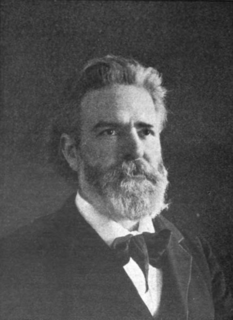A Quote by Edward Bulwer-Lytton, 1st Baron Lytton
A sense of contentment makes us kindly and benevolent to others; we are not chafed and galled by cares which are tyrannical because original. We are fulfilling our proper destiny, and those around us feel the sunshine of our own hearts.
Related Quotes
Divine love makes us true to ourselves and to others...
Divine love is the solution to our difficulties and problems.
It frees us from every kind of binding.
It makes us speak truly, think truly, and act truly.
It makes us feel one with the whole universe.
Divine love purifies our hearts and glorifies our being.
Perhaps we can only truly serve those we are willing to touch, not only with our hands but with our hearts and even our souls. Professionalism has embedded in service a sense of difference, a certain distance. But on the deepest level, service is an experience of belonging, an experience of connection to others and to the word around us. It is this connection that gives us the power to bless the life in others. Without it, the life in them would not respond to us.
It is not enough to behave reverently; we must feel in our hearts reverence for our Heavenly Father and our Lord, Jesus Christ. Reverence flows from our admiration and respect for Deity. It is something we feel inside our hearts no matter what is going on around us. It is also a personal responsibility. We cannot blame others for disturbing our reverent attitudes.
You are a child of God, small games do not work in this world. For those around us to feel peace, it is not example to make ourselves small. We were born to express the glory of God that lives in us. It is not in some of us, it is in all of us. While we allow our light to shine, we unconsciously give permission for others to do the same. When we liberate ourselves from our own fears, simply our presence may liberate others.
. . . the number of prayers we say may contribute to our happiness, but the number of prayers we answer may be of greater importance. Let us open our eyes and see the heavy hearts, notice the loneliness and despair; let us feel the silent prayers of others around us; and let us be an instrument in the hands of the Lord to answer those prayers.
The love of God again makes us free, for it draws us to set a low value on those things wherein we are subject to others - our wealth, our position, our reputation, and our life - and to set a high value on those things which no man can take from us - our integrity, our righteousness, our love for all men, and our communion with God.
Peace starts within each one of us. When we have inner peace, we can be at peace with those around us. When our community is in a state of peace, it can share peace with neighboring communities, and so on. When we feel love and kindness towards others, it not only makes others feel loved and cared for, but it helps us also to develop inner happiness and peace.
Before making peace, war is necessary, and that war must be made with our self. Our worst enemy is our self: our faults, our weaknesses, our limitations. And our mind is such a traitor! What does it? It covers our faults even from our own eyes, and points out to us the reason for all our difficulties: others! So it constantly deludes us, keeping us unaware of the real enemy, and pushes us towards those others to fight them, showing them to us as our enemies.
The attentions of others matter to us because we are afflicted by a congenital uncertainty as to our own value, as a result of which affliction we tend to allow others' appraisals to play a determining role in how we see ourselves. Our sense of identity is held captive by the judgements of those we live among.
Although our moral conscience is a part of our consciousness, we do not feel ourselves on an equality with it. In this voice which makes itself heard only to give us orders and establish prohibitions, we cannot recognize our own voices; the very tone in which it speaks to us warns us that it expresses something within us that is not of ourselves.
Emotional dependence is the opposite of emotional strength. It means needing to have others to survive, wanting others to "do it for us," and depending on others to give us our self-image, make our decisions, and take care of us financially. When we are emotionally dependent, we look to others for our happiness, our concept of "self," and our emotional well-being. Such vulnerability necessitates a search for and dependence on outer support for a sense of our own worth.
Our bodies need regular washing because we get dirty everyday. But so do our hearts! Because each day, people hurt us, offend us, forget us, snub us, step on us, reject us. But if we choose to forgive everyone everyday, we cleanse our hearts! We wake up the next morning refreshed and pure and lovely!






































